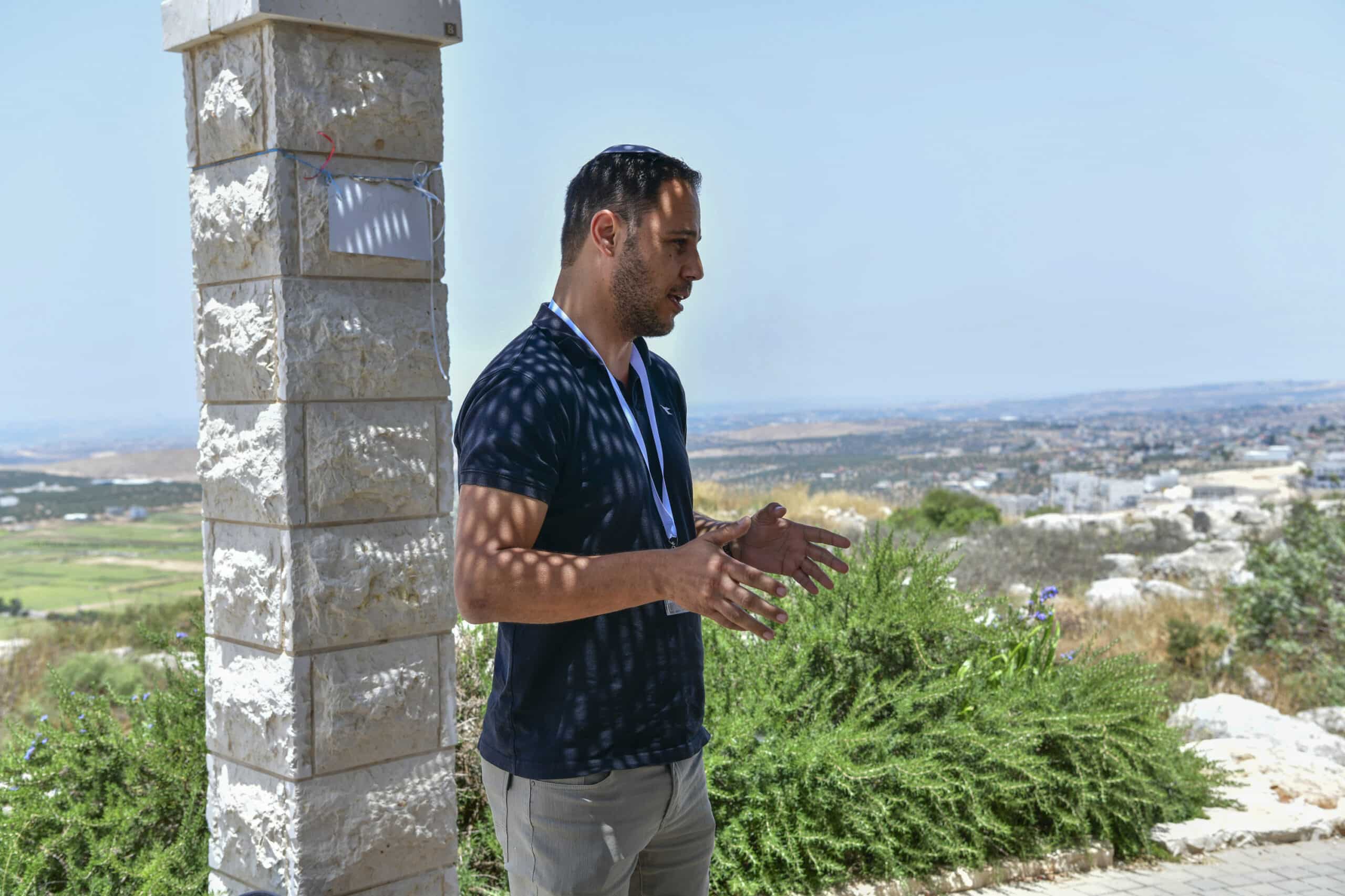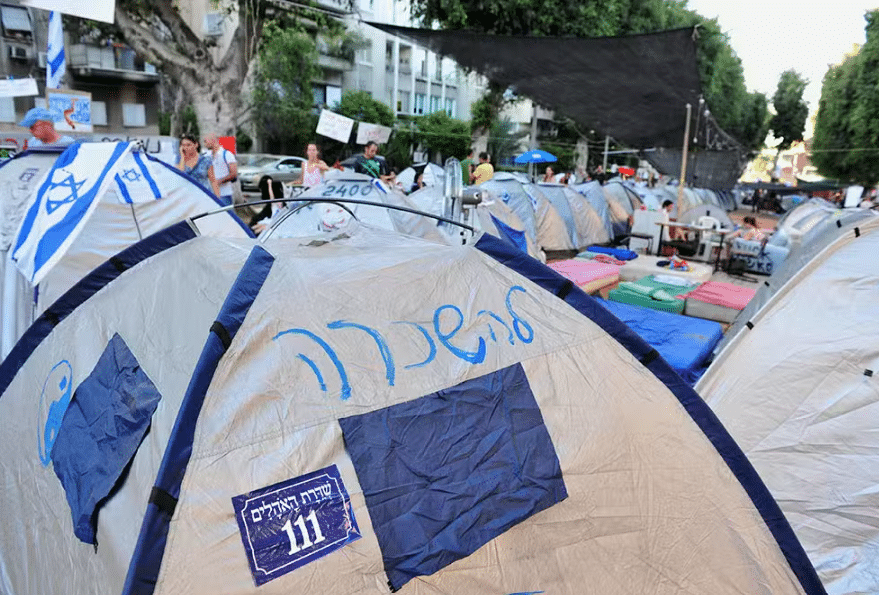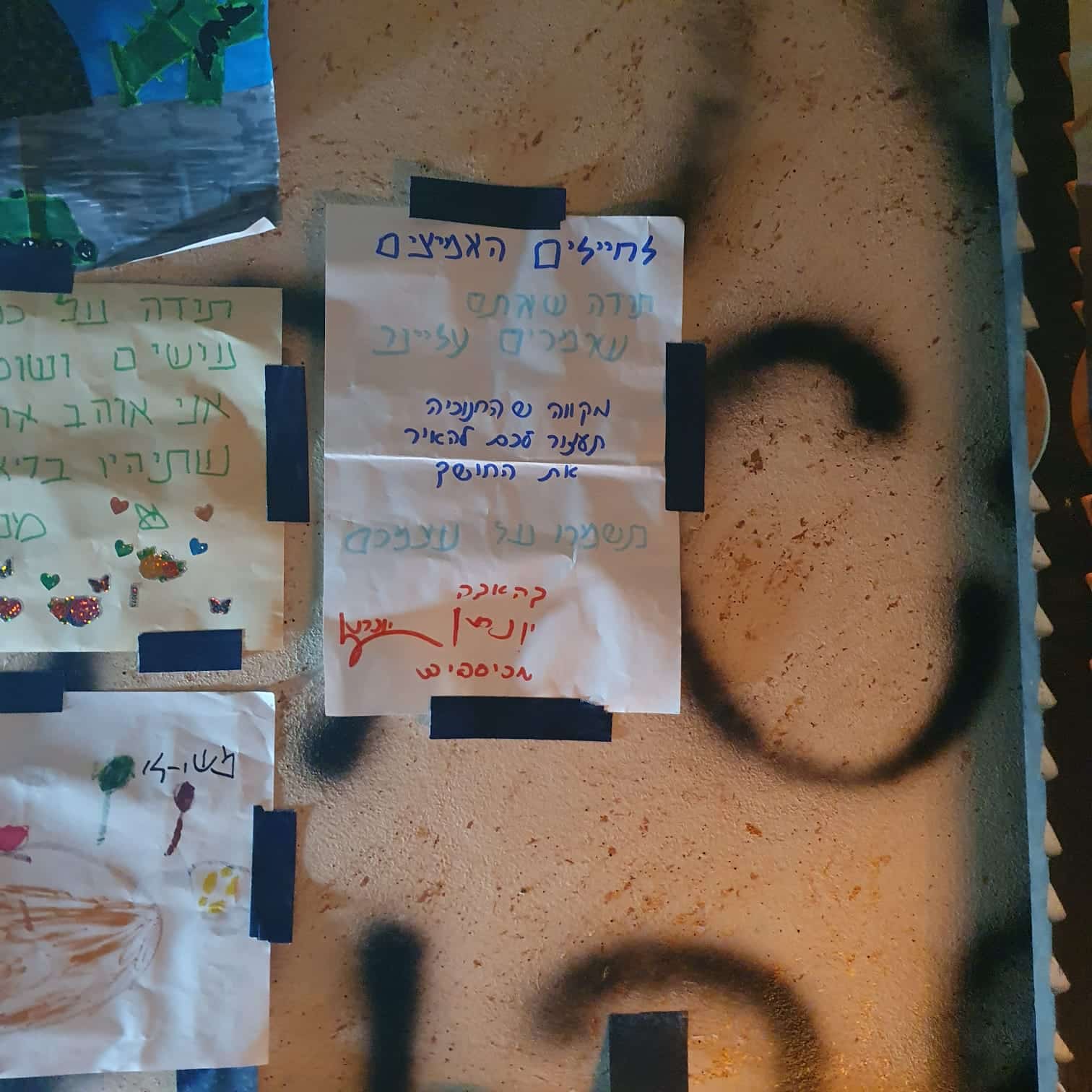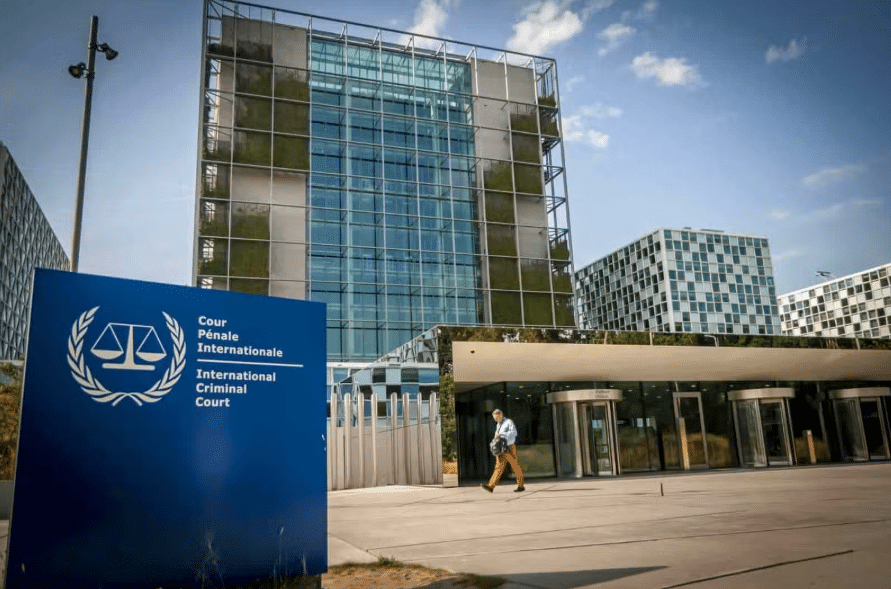
When Lieutenant Colonel (res.) Yaron Buskila, Director General of the IDSF HaBithonistim movement, ended a 24-year term of service in the IDF where he served as a combat soldier and commander, he traveled to South America, and found himself one day on a volcano in the middle of a storm, with a group of hikers in need of rescue.
“There was a hail storm and heavy fog”, he recalls, “and we just couldn’t find our way back. I tried to get on the internet to report our location, and when I connected, a Facebook post immediately popped up about the new movement called the IDSF HaBithonistim, founded by General (res.) Amir Avivi, whom I had never met. From that stormy mountain, I wrote to Avivi: “Amir, this is exactly what I need. The minute I land in Israel, I want to meet you”.
If you’re wondering what happened to the group – Yaron navigated and led it back to the point of departure and all its members were rescued.
“I Came to The Understanding That I’m Discharged from The Army – Not the Country”
The announcement on the foundation of the IDSF HaBithonistim movement reached Yaron at an opportune moment, after deliberating during the months before leaving the army what he wishes to do going forward.
What where you deliberating about?
“I was offered a variety of positions in the private sector, with remunerations that I could only have dreamt of previously. But something weighed down on me. I had to ask myself: ‘after dedicating my life to the protection of the country, is my sole purpose in life now merely making money?’ I am being discharged from the army but not from the country. I want – and must – continue to make a difference through my work”.
What about Amir’s message caught your attention?
“Amir talked about giving security issues a platform that had not been voiced until then – despite the sentiments on the streets of Israel. I felt there was something very right about what he was doing. The army has its perspectives that are not necessary correct many times, not to mention biased often by foreign considerations and oriented towards professional considerations alone. There are not enough voices challenge the military chiefs. I myself had experienced this when serving in the army, when, for example, I would try to raise the need for better security of the IDF’s military basis, or about the professional level of the reserves array, or even about the rules of engagement that in their present form – require soldiers to place themselves in harm’s way to protect the enemy”.
So, you bring it up to the command. How do they react?
“The tell me that it’s not my role to talk. Even in my last position – a base commander – I witnessed how the poor state of preparedness of the base was glossed over. I said to myself that something must change here because one day we’ll really find ourselves in a state of war, unprepared, and will have to deal with the consequences of the negligence and lack of professionalism”.
Is the security misconception an army issue or is it more widespread?
n the days and indeed years leading to the October 7 massacre, the leadership of the security and political system, was caught in what was dubbed in Israel “the (mis)conception” – The absolute, unchallenged uncertainty in these circles on the military superiority of Israel, which included the belief that the border with Gaza is impermeable thanks to a cutting edge multi-billion/million security system. This rigid change-resistant approach was oftentimes blind to oppositional or simply different approaches and ideas, even when all evident painted a clear picture, thus the system failed to raise the alarm bells on the night of October 6.
“Before I blame the government, the IDF and the General Security Services for the October 7 attack, I first blame us, society. We took to the streets to protest the economic reforms, the cost of living, of houses, of cottage cheese. But never have we protested in earnest about the ongoing suffering of the Negev communities from the rockets and explosive balloons, or about the fact that children in in Kibbutz Nir Oz play in a kindergarten that is completely surrounded by concrete safety structures, and about the mounting danger growing right under our noses. We’ve chosen to put up with this, instead of conveying incontrovertibly to the decision-makers that the current situation is unacceptable”.

“Thank You For Being a Voice”
Upon arriving back to Israel from South America, he met with Brig. Gen. (res.) Amir Avivi and asked him how many members the movement has. The answer at the time was ten. Since that meeting a decade ago, the number soared exponentially and is now 35,000 officers, soldiers and civilians.
Today, do you feel that the security voice that was absent receives an appropriate platform?
“Not a week goes by without a senior officer telling me – ‘good for you. I cannot speak out (as a member of the military), so thank you for being a voice for me’. I even had generals telling me – ‘it’s good you’re doing this because you’re saving the army’”.
What makes the IDSF HaBithonistim movement succeed where others failed?
“The important thing is that the Movement approaches the military profession and Israel’s security needs without bias and without a political agenda whatsoever. In order to truly and fully understand the security situation and formulate a suitable strategy, one must rely on facts rather than self-serving needs and personal believes, which cloud the ability to make an objective analysis of the situation. Israel’s security apparatus, the media and part of the public base their perception of the situation on concepts that are either misguided or based on hopes and believes that ended crashing into the wall of reality, time and time again. The IDSF HaBithonistim movement has the knowledge and hands-on experience coupled with a clearly defined goal of knowledge–sharing to state exactly what is needed to safeguard the security of Israel to ensure its existence down the generations in the chaotic and volatile geopolitical environment of the Middle East, based not on pipe dreams and believes but on the understanding that our enemies will forever strive to harm Israel and create the opportunity to annihilate it”.
What does it mean to act without bias or political agenda?
“It means that in the IDSF HaBithonistim movement there is simply no room for politics, but only for approaches that come from a fact-based and professional thought. The Movement’s position is, that Israel needs defendable borders and the freedom to defend itself, and this calls from a strategy that is based on facts on the ground. We have room for all opinions, so long as they are based on professional, objective and verified facts”.
Were you able to sidestep the misconception?
“No. I can tell you that as far back as January 2022 we raised the alarm to the command of the security establishment that Hamas is not deterred – far from it, sitting in wait for the opportune moment. We put the limelight on the convergence of arenas that Iran is aiming at through its proxies. We even said that it is advisable to thwart Iran’s schemes from within Gaza. Amir Aviv had even warned that if we don’t do so – then in a year or two down the road, we’ll encounter a Hamas that is at the peak of its power, saying in the following words: ‘if we fail to take initiative, we will find ourselves in a Yom Kippur [War] scenario’. Tragically, all these forecasts, which were based on an exhaustive paper we had authored and presented to the government, have come true”.
“Remembering What We’re Fighting For”
And indeed, the misconception red flagged by the IDSF HaBithonistim movement before the political decision makers, came crashing tragically on Israel’s head with the horrific events of October 7 In the outbreak of those events, Yaron spend an entire day driving from one battlefield to another, cobbling together control teams, rescuing and evacuating as many survivors of the attacks as he could. By the end of that day, he was on the verge of physical and emotional collapse.
“After I saw what I did on October 7, my eyesight literally became black”, he recounts the difficult moments from that day. “Then, on October 8, I drive to a mission in one of the main roads of the Gaza envelope communities, and see before me a huge traffic jam that ran from Be’er Sheba to the Ze’elim military base. Tens of thousands of cars – all reservists who didn’t wait to be summoned and came to volunteer, without anyone telling them to do so. I looked at this and told myself that this is cause for optimism”.
What epiphany did you have at that moment?
“That in the end of the day, despite the deep social chasm in Israel on October 6, after the disaster the day later, the nation understands that it’s time for unity. In other countries, harsh wars rip apart entire nations, topple governments and wreak havoc. In Israel, it’s the other way around – when the sword is on our neck we unite, fight – and win. That bloody Saturday had proven in a stellar manner that the Israeli nation is stronger than we had ever could imagine”.
What is the IDSF HaBithonistim movement’s most important achievement since October 7?
“We’ve contributed to promoting the belief among Israeli society and government, that it is possible – and crucial – to enter the Gaza Strip and overthrow Hamas. We’ve voiced a clear and uncompromising stand for the moral imperative to engage in a war to crush Hamas and return the Israeli hostages. We encouraged the people and the leaders of Israel and changed the public discourse through the media”.
In what fashion did you encourage the Israeli leadership?
“We tried to get them to rise to the importance of the emerging opportunity to change the map. In my first meeting with PM Netanyahu the day after the October 7 attack, I said to him: ‘I can tell you one thing – at this point in time, the people are not behind Benjamin Netanyahu, but the entire nation stands behind the Prime Minister. Launch this attack’”.
Did you conduct activities with the troops in the field?
“Yes. We endeavored to lend as much support as possible to the commanders in the field. Similarly to the political leadership, it is important to continue inspiring the belief in their mission. I remember getting into a motivational talk with my division commander, Brigadier General Avi Rosenfeld, after which he hugged me and thanked me, saying that he needed that moral boost. Every commander needs to feel that their subordinates are with them”.
You had said that in order to win – one must remember the cause. What cause do you fight for?
“I’ll tell you something. When taking over Beit Hanoun in the northeast tip of the Gaza Strip, an amazing thing happened. Normally, when choosing the location of the brigade commander’s HQ in the field, the first order of the day is to put up a sandbag wall around the parameter to protect it against snipers. But the commander of the 5th Brigade, Colonel Tal Koritzky, doesn’t do that, but something completely different. He orders the soldiers to pull out the letters they received from children from their vests, and hang them on the wall – right in front of their eyes. I ask him why this is his first order, and he explained: ‘I want my soldiers to remember why we’re here. Not to conquer Gaza or kill, but for the protection of future generations.’ So that’s what I’m fighting for – for the next generation.”

“Winning In the Hague Won’t Beat Terror”
The IDSF HaBithonistim’s third arena of activity aimed at boosting national moral during the Gaza War is the media.
Your media-footprint has increased exponentially since October 7. What do you think caused this?
“This happened because we’ve introduced another voice into the public discourse. The public wanted answers, and the media finally started giving a platform to those who do not parrot the usual political rhetoric. Also, thanks to our work and media presence, the tone of the discourse has changed and shifted to a language of strength which calls for the elimination of the enemy until victory, instead of opinions that try to walk on eggshells. Until then, we always tried to win at the Hague international court. The problem was that if you win at the Hague – you don’t beat terror. Anyhow, chances are of winning in the Hague are slim”.

“Cooking For Soldiers Is No Less Significant Than a Commander’s Motivational Talk”
Nearly all the Movement’s veteran members reported for prolonged reserve’s duty following the October 7 attack. As an officer of the Gaza Division’s Operations Directorate, Yaron served in the reserve duty for 150 successive days, while at the same time leading the Movement and together with the many other members stepping up to help the soldiers in the field.
“We set up a whole system of logistic support and the transfer of combat equipment to the soldiers,” he says. “The contribution of this to morale on the ground is enormous, and I emphasize morale – because when a soldier gets a tactical helmet, it’s not only that he receives grade A equipment, but he also knows that he is being thought of and supported. This kind of mobilization in Israeli society really exists across all walks of life throughout the entire country. In my community, for example, all the women have been cooking, every single week, for the fourteen months since the outbreak of the war – and every week a military Hummer comes and collects the food for the soldiers in Gaza. This is no less important for motivation than a battalion commander’s motivational talk.”

“Cultivating A Generation of New Commanders”
Perhaps the most important way in which the IDSF HaBithonistim movement is boosting national resilience in the long term is through education. In the coming years, the Movement intends to establish a network of pre-military preparatory programs, the first of which will operate in Moshav Tekuma in the Gaza envelope – in part to assist with the rehabilitation and support the communities there, especially the moshav itself, which was severely damaged on October 7.
How did the military preparatory program initiative come about?
“During the Gaza War we saw the strengths of the commanders and leaders, but we also saw shortcomings and understood that this is something that must be addressed among others, by cultivating a future generation of commanders instilled with the values of Zionism on which the IDSF HaBithonistim movement is based. We are getting a deluge of astonishing positive feedbacks and are witnessing a huge demand for such programs across the country”.
What other educational activities does the IDSF HaBithonistim movement conduct?
““We are sent on part of the IDF to give talks in educational institutions and conduct recruitment conferences. We are now the leading organization in Israel that engages in the motivation of youth to enlist to military service. We also plan to expand our educational enterprise to Jewish youth overseas, with the aim of encouraging Alyia (immigration to Israel) and cultivating a strong Zionistic identity, and if God is willing – we aim to expand our activity to academic institutions as well”.
Was there any particular moment that had shown you the power of education?
“While I was in the field, fighting, Amir had met up with me at the Nova festival area. A male and female officer approached us and said: ‘We heard you talk when we where at the military preparatory program at Be’er Orah’, and they asked whether we would be willing to come speak to their soldiers. We both had spoken in the program at lease once. I said to Amir: ‘Look at that. A one-year preparatory program, endless lectures and talks, and they say that meeting us had such an effect on them. And that’s only after one talk. Imagine what can be accomplished with a half a year or year in a military preparatory program; the effect this could have on the youth”.
“Charting the Day After the War”
Alongside its activities for cultivating the future generations of determined Zionists, the IDSF HaBithonistim movement is driving change in the immediate term as well. Throughout the year, the Movement’s research department has been publishing policy studies and position papers on a variety of local and foreign security-related topics, which are submitted to decision makers. Some of the studies and papers become initiatives promoted by the Movement on an individual project basis. These include housing benefits to reservists, advocating minimum prison sentences for stone-throwing terror, and the prevention of the transfer of funds from the Palestinian Authority to terrorism.
Two of the Movement’s new initiatives, published in December 2024, are the “8000 Plan” for recruiting the ultra-Orthodox community for mandatory service in the security forces and the “Islands Plan: Humanitarian Administration as an Interim Stage in the Gaza Strip,” which deals with eradicating Hamas while preventing a humanitarian crisis and preparing the ground, i. e. Gaza, for the day after the war.
Beyond specific initiatives, do you see that the Movement was able to affect change in the decision-making echelons since you were founded?
“Absolutely. We see a marked change. The members of Knesset had stopped taking at face value what every military, police or GSS member say, and they now want to hear additional views. Most normative people ask for second opinions before opting for surgery, so it’s surely time for MKs to demand second opinions before they make crucial decisions pertaining to the entire nation’s security. The Knesset – Israel’s parliament – is a reflection of Israeli society in its entirety, which is no longer willing to automatically accept the decisions of their public elects. The credit for this goes to those who dared to speak out and voice a different opinion – even if it’s unpopular”.
Does the IDSF HaBithonistim movement have future plans in the area of research?
“Yes. One of our goals for the coming year is the upscaling of our research department into a research institute for all intents and purposes, which will collaborate with international researchers, including those who specialize in specific countries such as Russia and China. This networking is important in order to deepen our positioning as a leading research authority that should be taken seriously.”
United Against Misconception
As mentioned, the IDSF HaBithonistim movement already has more than 35,000 members – but Yaron wants more. Many more.
Why is it important for you to grow the Movement?
“Because the movement is only as strong as the general public behind it. The IDSF HaBithonistim is a social movement even before being security-oriented. Our goal is to give all walks of Israeli society the power to make a difference, including those who until recently found themselves silenced. This is not a movement for any political or academic elite, but for everyone. We invite anyone who wishes to contribute to Israel’s security and not just sit at home worrying about it to join and choose the way they want to make an impact.”
And what if I identify with the Movement’s messages but don’t have time to join its activities?
“There’s still a lot you can do: share our posts, articles and videos and expand the circle of our followers on social networks, and thus support and influence. Our content on the website and on social media creates many ripples that change perceptions and outcomes, and those who share them help us ensure that Israel does not get caught up in misconceptions again. Think about it – preventing the next misconception and realizing Israel’s security are right at the tip of your fingers.”
Image credit: Personal album Yaron Buskila / Shutterstock





